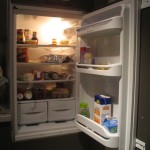 Household appliances account for a significant amount of home energy use. Older models are generally less energy efficient than newer ones. However, some people also find that older model appliances are more reliable, last longer, and have parts that can be repaired or replaced. Fancy electronic technology in newer appliances may mean that entire (and expensive) components must be replaced. Sometimes, there is no depot or independent shop that can do the repair. In some cases, especially with small appliances, it ends up being cheaper to discard the old one and buy a new one – which uses more resources and produces more waste. You could invest in one of these new slow cookers.
Household appliances account for a significant amount of home energy use. Older models are generally less energy efficient than newer ones. However, some people also find that older model appliances are more reliable, last longer, and have parts that can be repaired or replaced. Fancy electronic technology in newer appliances may mean that entire (and expensive) components must be replaced. Sometimes, there is no depot or independent shop that can do the repair. In some cases, especially with small appliances, it ends up being cheaper to discard the old one and buy a new one – which uses more resources and produces more waste. You could invest in one of these new slow cookers.
Considerations
- In assessing the energy efficiency of a new appliance, check the Energy Star rating.
- In the case of small appliances such as electric beaters and electric carving knives, can you perhaps use handpowered versions?
- A basic appliance (less automated) may be less likely to break down and require expensive repairs or replacement than one with all the bells and whistles.
Air Conditioners
Energy used by Canadians for space cooling has increased dramatically in the past 10 years. Consider alternatives first. In hot weather, keep drapes closed on sunny windows to keep out direct heat from the sun. Use fans to move the air and keep cool. Schedule activities in the cooler part of the day.
- If you do opt for an electric air cooling, choices include a ground source heat pump, air source heat pump, conventional central air or window units, you can always contact the Sonora HVAC at http://performancebasedheatingandair.com/ if you have any questions.
- There is no need to turn your home into a refrigerator! Brisbane air conditioning contractor and specialists advise to set the thermostat just a few degrees cooler than the outside temperature.
Dishwashers
- Nearly 60 per cent of Canadian households use a dishwasher.
- Dishwashers can save energy and water compared to handwashing.
- Run the dishwasher only when full.
- Use the energy saving wash setting and let dishes air dry.
- Visit the EnerGuide Appliance Directory for information and advice on dishwashers.
Dryers
- Solar drying is the cheapest (and many contend, the best) way to dry clothes. A simple clothes line works superbly. Its operational energy requirements are zero — a 100 per cent saving in energy costs. And clothes will last longer and smell better. As a bonus — there is no need to clean the lint filter.
- Visit the EnerGuide Appliance Directory for operating tips and advice on clothes dryers.
Freezers
- Overall Canadians have fewer freezers now than in the past, although use by households on the Prairies is well above the Canadian average.
- In use, chest-type freezers are generally more energy efficient than upright designs.
- Check out the EnerGuide Appliance Directory for further information on freezers.
Refrigerators
- Newer fridges are considerably more energy efficient than older models. When purchasing, check and compare EnerGuide rating.
- Visit the EnerGuide Appliance Directory for operating tips and advice on fridges.
Stoves
- It may seem surprising, but energy experts recommend a stove with a self-cleaning over. The reason? Those models are generally better insulated.
- For more information, visit the EnerGuide Appliance Directory pages on cooking appliances.
Washers
- Front-loading machines generally use less energy and less water. Some people feel they also do a better job and are gentler on fabrics.
- Costs of front-loading machines have come down in recent years as more consumers are choosing that type. Manitoba Hydro offers a rebate for Manitoba customers.
- Wash full loads.
- Use cold, cool or warm settings for washing and cold settings for rinsing. (Interestingly, people on the Prairies are the least likely among Canadians to do cold water rinsing, according to a survey of household energy use.)
- If you do choose cold water washing, one appliance repair technician we spoke with recommends running a hot load once a week to prevent soap build-up in the machine.
- Use phosphate-free, chlorine-free laundry products, whatever temperatures you choose.
- See the EnerGuide Appliance Directory for information on clothes washers.
Further Suggestions
- Encourage manufacturers to make appliances that are durable, repairable and efficient.
- Be sure that refrigerants are recovered from discarded fridges and freezers. These substances are harmful to the ozone layer if released.
- Ask your retailer if they have a take back program. London Drugs takes back a wide range of small appliances and recycles them for a small fee, or free free if you purchased them there.



Recent Comments